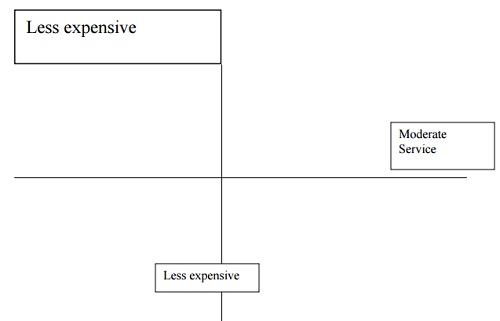Chapter: Business Science : Services Marketing : Service Delivery and Promotion
Positioning Maps
POSITIONING MAPS
Position mapping involves
graphically mapping a firm and its competitors relative to the two major purchase
criteria. To be of benefit, the axis of the graph needs to be the two most
important criteria consumers use in choosing a vendor from within an industry.
For trucking firms, the most important criteria may be on-time delivery rate
and cost. For a professional service such as surgery, the most important
criteria may be competence and availability.
The position map allows
a company to see what position they occupy in the mind of consumers relative to
their competition. For a potential new entrant into the market, the position
map will show possible gaps that are not currently being served by anyone. The
map may also suggest a new position for a firm currently in the market.
Steps in positioning:
STEP -1: DETERMINE THE CORRECT POSITION:
The first step in
determining the correct position for a service is to identify the fir important
to look at competition from a consu vendors do consumers consider? The list of
vendors generated is the competing firms.
STEP-2:
ASSESS CONSUMER PERCEPTION:
The second step in the
process is to assess consumers‟ perceptions of each firm in the industry.
Consumer perceptions
are crucial in positioning. The position a firm believes they occupy or the
position they would like to occupy is irrelevant at this point.
STEP-3: DETERMINE THE POSITION OF EACH
FIRM:
Based on information
gained from consumers, the third step is to determine the position of each firm
within the industry. Using the position map is an excellent method of doing
this. The map will allow firms to see where they are relative to their
competition.
STEP-4: ANALYSING CONSUMER PREFERENCES:
The fourth step in determining the correct consumer
position is to analyze consumer preferences. This information is difficult to
obtain but is important in making a positioning decision. Analyzing consumer
preferences involves determining why consumers prefer one firm over another.
STEP-5 MAKING CONSUMER POSITION
DECISION:
Based on the information gained, a firm is ready for
the fifth step; making a consumer position decision.
The decision may be to
remain positioned where it is. However, if a firm is unhappy with the position
it occupies in consumers‟ minds, it may want to be very careful. Changing the
position of a firm in consum become ver entrenched. Consumers have to be
convinced that what they believe about a firm in reference to its competition
is wrong or that it must be modified.
STEP-6: DEVELOP A STRATEGY:
The final step in the
process is to develop a strategy to implement the new position or to reinforce
the current position.
Conduct internal market and competitor analyses:
Market analysis:
It addresses the overall level and trend of demand
and the geographic location of the demand.
Research may be needed
to gain a better understanding of not only customer needs and preferences
within each of the different segments but also how each segment perceives the
competition.
Internal corporate analysis:
It focuses on
identifying the organizations resources [financial, human labor, physical
assets] any limitations, it‟s goals [profitability, growth it does business.
From the analysis, we
can select a limited no. of target market segmentation that can be served with
either new/existing services.
Competitive analysis
It emphasis on the
strength, weakness, may suggest opportunities for differentiation, the company
can determinetunitiesit‟stoachieveoppordifferentiation.
Position statement:
It is the outcome of
integrating these 3 forms of analysis. This describes the described position of
the organization in the market place.
[Refer Pg. 67 fig 3-3.]
Anticipating competitive response:
The best way to anticipating competitive response is
to identify all current and potential competitors and
to put oneself in their
own management‟s shoes the firms.
Stimulate models can be done to analyse the impact
of alternative competitive moves.
* How
would a price cut affect demand
*
How long would it take before customers
responded to a new advtg campaign designed to change perceptions?
Evolutionary positioning:
It is responsing to
changing market structures, technology, competitive activity. Some business
lend themselves to evolutionary repositioning by adding/deleting services and
target segments.
[offering extended hrs. of service, added banking
services]
Use positioning maps to plot competitive strategy:
It is a perceptual mapping.
It is a useful way of representing customers
perceptions of alternative products graphically.

Competitive positioning :
Firms may have to
undertake significant change in an existing position. Such a strategy is known
as repositioning –means revising service characteristics/ redefining target
market segments]
Change perceptions through advertising:
Improving negative
brand perceptions may require extensive redesign of the core
product/supplementary services.
Weaknesses are perceptual rather than real.
Innovation is positioning:
One way to compete is to introduce new dimensions
into the positioning equation that other firms can‟t immediately match.
Related Topics